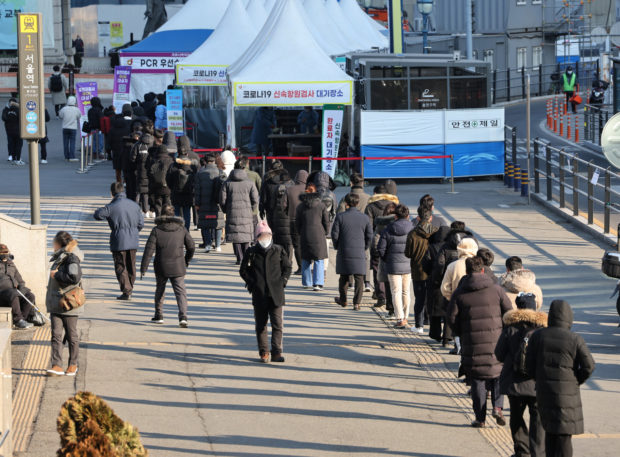S. Korea’s daily COVID-19 cases rise closer to 100,000 over raging Omicron

People wait in line to receive tests at a COVID-19 testing station in Seoul on Thursday. (Yonhap via The Korea Herald/Asia News Network)
SEOUL — South Korea’s daily COVID-19 cases hit another high Thursday, exceeding 90,000 for the second consecutive day, amid few signs that the spread of the highly contagious Omicron variant will subside.
The country reported 93,135 new COVID-19 infections, including 93,045 local cases, raising the total caseload to 1,645,978, according to the Korea Disease Control and Prevention Agency (KDCA).
The number of daily cases rose sharply Wednesday to surpass the 90,000 level for the first time ever, coming to 90,443 from the previous day’s 57,164, with a majority of infections being caused by the Omicron variant.
The daily tally nearly doubled in a week, and it grew by more than fourfold compared with two weeks ago.
The death toll from COVID-19 came to 7,238, up 36 from Wednesday. The fatality rate was 0.44 percent, the KDCA said.
Article continues after this advertisementThe number of critically ill COVID-19 patients came to 389, up 76 from a day earlier. The daily tally stayed above 300 for the fourth straight day, and the authorities have warned of a possible uptick in serious cases in a couple of weeks.
Article continues after this advertisementIntensive care unit beds for critically ill patients were 28.5 percent occupied nationwide. It has been at a stable level, but concerns over a possible shortage linger as the total infections have grown at a fast pace.
The daily infections could reach 170,000 by around the end of this month, though it is too early to say if it will be the peak of the Omicron surge, according to the health authorities. A state-run science institute forecast that the figure could rise to as high as 360,000 early next month.
Despite the unprecedented wave of infections, the government is reviewing an option of easing current strict social distancing rules due mainly to minimizing their impact on small businesses.
Under review is relaxing the current cap on private gatherings of six people and a 9 p.m. curfew on restaurants and cafes nationwide, while maintaining a vaccine pass system, which requires proof of vaccination or a negative test result to use certain types of public facilities.
The government will announce whether to adjust the antivirus curbs Friday.
As of Thursday, 29.9 million people, or 58.3 percent of the country’s 52 million population, had received booster shots. The number of fully vaccinated people came to 44.26 million, accounting for 86.2 percent, the KDCA said.
Of the locally transmitted cases reported Thursday, Seoul reported 19,678 new cases, and the surrounding Gyeonggi Province and the western city of Incheon added 28,438 and 7,235 new patients, respectively. Combined, the greater Seoul area accounted for 59.5 percent of the country’s total infections.
The number of patients receiving at-home treatment also rose to a fresh high of 314,565 Thursday, topping 300,000 for the first time.
The KDCA earlier said that around 10 percent of the COVID-19 patients have received treatment at hospitals or community treatment centers, with the remainder being treated at home, a move to effectively handle the drastic surge in infections and to better focus on serious cases. (Yonhap)
RELATED STORIES
S. Korea’s new COVID-19 cases over 50,000 for 5th day amid worries over further spike
New COVID-19 cases in S. Korea hit record high of over 56,000 amid Omicron surge
S. Korea’s new COVID-19 cases soar to all-time high of over 50,000 amid raging Omicron
S. Korea turns to self treatment as Omicron fuels soaring COVID-19 cases
South Korea extends social distancing rules as Omicron cases spike
For more news about the novel coronavirus click here.
What you need to know about Coronavirus.
For more information on COVID-19, call the DOH Hotline: (02) 86517800 local 1149/1150.
The Inquirer Foundation supports our healthcare frontliners and is still accepting cash donations to be deposited at Banco de Oro (BDO) current account #007960018860 or donate through PayMaya using this link.